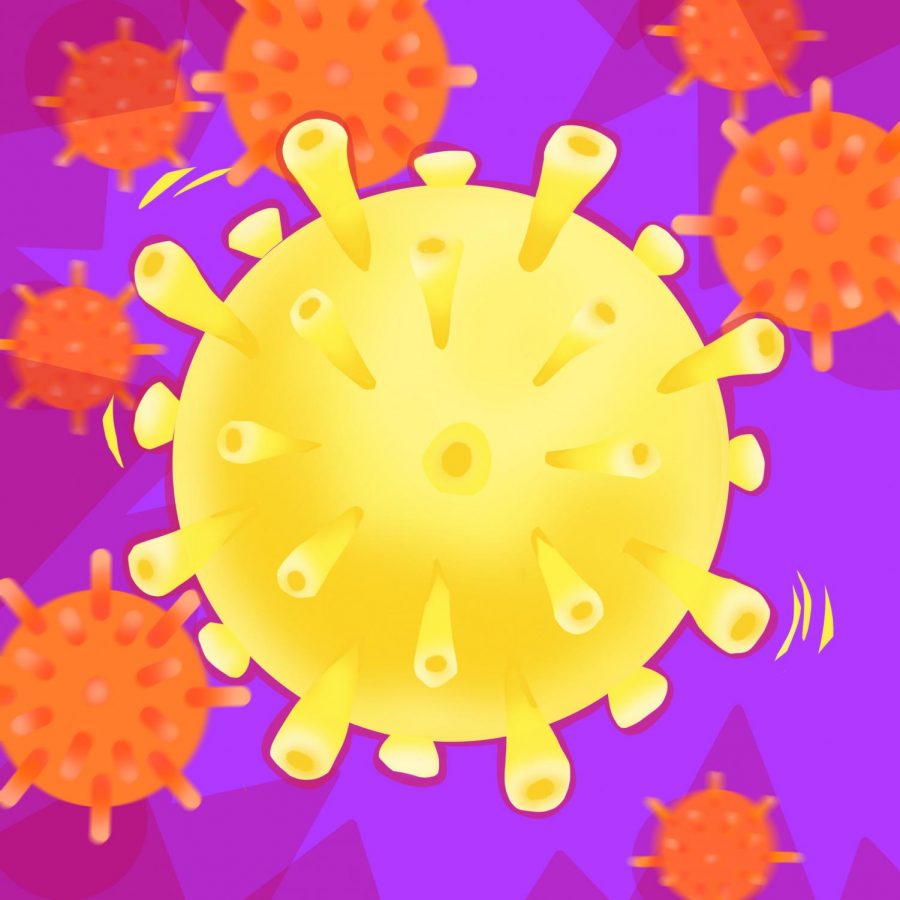Vaccinated individuals can spread COVID-19 Delta variant but at reduced risk
August 9, 2021
Correction: This story has been updated to say that there have been dozens of variants of COVID-19. A previous version of this story had said there were thousands.
As COVID-19 cases start to rise in Benton County again because of the Delta variant, health officials claim that vaccines are still the best method to protect against severe illness.
According to Paul Cieslak, the medical director for communicable diseases at Oregon Health Authority, a relatively new strain of COVID-19 known as the Delta variant has been found to be more infectious than earlier strains.
“Sixty-three of the last 68 strains that we’ve sequenced in the state of Oregon have been Delta, so there’s almost nothing else left,” Cieslak said. “And that’s because it’s more transmissible. A lot of studies have found that you are shedding larger quantities of virus when you get infected by it, and that probably accounts for the increased contagiousness of it.”
According to April Holland, the Benton County Public Health administrator, the Delta variant is about three times more infectious than earlier COVID-19 strains. She also said that people who test positive for this Delta variant can have a viral load that is 1,000 times higher when it’s first detected.
“That’s a lot of shedding, and the likelihood that a close contact will be exposed to an infectious dose is higher,” Holland said. “This suggests that the mechanism behind Delta’s transmissibility is that there’s a lot more of it, and sooner. With more virus around, it’ll be easier to spread.”
The high transmissibility of this strain does include even fully vaccinated individuals, who can still be infected by and spread the Delta variant.
“It was initially thought that, as with earlier variants, fully vaccinated people would not be able to transmit disease or would transmit less than unvaccinated people,” Holland said. “Though vaccinated people represent a small proportion of transmission occurring now, the data suggests that with the Delta variant, even people who are vaccinated are able to transmit the disease to others.”
However, while Holland said the Delta variant can generally cause more severe issues, these are much lower in vaccinated individuals.
“Being fully vaccinated is very important to receive the best protection from this variant,” Holland said. “Vulnerability to Delta among partially vaccinated people makes sense because partially vaccinated people have low levels of neutralizing antibodies—Delta can overcome this defense by sheer numbers. Fully vaccinated people have high titers of neutralizing antibodies and mature memory B and T cell responses. It’s harder for Delta to overcome this by strength in numbers.”
In other words, those who are fully vaccinated and have a higher concentration of COVID-19 antibodies protecting them have a reduced risk of the illness being severe or life-threatening if infected but can still spread the virus to vaccinated and unvaccinated individuals.
According to Holland, in July, 20% of COVID-19 cases in Benton County were fully vaccinated individuals and 60% of these cases reported only mild symptoms and none were hospitalized.
On July 29, the OHA held a live Q&A on Facebook to address community concerns about the Delta variant and to encourage Oregonians, both vaccinated and unvaccinated, to start wearing masks in indoor public places again.
According to Holland, masking can reduce infection by at least 70%.
“The CDC [Centers for Disease Control and Prevention] recommended [masking] for jurisdictions that had an incidence of at least 50 cases per 100,000 population in the last seven days and, statewide, Oregon is at about 70 per 100,000 and the governor endorsed this recommendation for the entire state of Oregon,” Cieslak said.
According to Cieslak, there is no current plan to require masking in most public places. Some places such as buses, planes, public transportation hubs and health care settings do still require masking, and teachers and students will be required to wear masks when school starts in the fall.
“Beyond that, we’re deferring to local authorities and businesses as to whether to require masking based on their local circumstances,” Cieslak said.
Chunhuei Chi, a professor of health management and policy and director of the Center for Global Health at Oregon State University, said there have already been several dozen variants of COVID-19 as the living organisms that make up the virus continue to evolve so it can survive.
“By now, [what] we have observed across the world is wherever COVID-19 is widespread and out of control, like what happened in the U.S. last year, that’s where they develop a variant more quickly,” Chi said.
According to Chi, this means that as long as COVID-19 is unable to be contained, new variants will appear in places where it spreads uncontrolled and the virus will not go away.
“That all makes vaccination even more important,” Chi said. “Even though our current vaccine’s effectiveness of protecting vaccinated people from infection has dramatically declined facing the Delta [variant], but it is still very highly effective in preventing severe symptoms, hospitalizations and death.”
Increasing COVID-19 cases can cause a heavy burden on the healthcare system, Holland said, and Benton County residents are highly encouraged to practice physical distancing in crowded settings, wash their hands frequently with soap and water and limit gatherings with people outside their house to reduce their spread and risk. This is in addition to wearing masks when in public spaces and being vaccinated.
“Getting vaccinated isn’t just about one individual—it’s about protecting the people around them,” Holland said. “If enough people are vaccinated and are also taking precautions, even a contagious variant like Delta will hit too many dead ends to continue spreading in the population.”




















































































![Newspaper clipping from February 25, 1970 in the Daily Barometer showing an article written by Bob Allen, past Barometer Editor. This article was written to spotlight both the student body’s lack of participation with student government at the time in conjunction with their class representatives response. [It’s important to note ASOSU was not structured identically to today’s standards, likely having a president on behalf of each class work together as one entity as opposed to one president representing all classes.]](https://dailybaro.orangemedianetwork.com/wp-content/uploads/2025/03/Screenshot-2025-03-12-1.00.42-PM-e1741811160853.png)
























